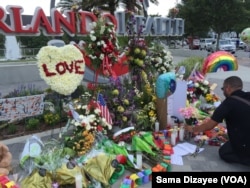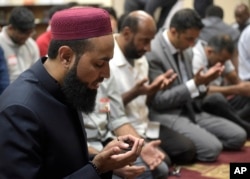After the worst terror attack on U.S. soil since 9/11, Muslims in the Orlando, Florida, area say they feel the backlash and have received thousands of pieces of hate mail in the last couple of days, VOA has learned through interviews with local residents.
"The Muslim community has experienced severe backlash in the last 36 hours since this happened and the world came to know about it. Thousands of [pieces of] hate mail, calls and threats have been logged by phone, by email, through social media against our community here in central Florida, Orlando," said Imam Muhammad Musri, the president of American Islam, a national group representing moderate U.S. Muslims, and a member of the Islamic Society of Central Florida.
Despite the efforts by the larger community in Orlando to keep rising tensions and anti-Muslim rhetoric in check, Muslims in the city feel uneasy and concerned about the situation.
Musri said that the Muslim community understands the anger of the people in Orlando, but added that the anger should be channeled in a positive direction to help other people in need.
Zarghee Mayan, who was born in Kandahar, Afghanistan, and grew up in New York City, runs a fried chicken restaurant in Orlando. He told VOA that, like a majority of people in Orlando, the attack caught him by surprise.
"I think this was a cowardly attack. … The people in Orlando and entire America, we keep going through terrorist acts like this by cowardly people. It is hurting us as Afghan-Americans over here," Mayan said. "Everywhere I have been today, I have seen people looking at me the wrong way. I hear people talking wrong [and saying bad things] about Muslims."
Online funds set record
In the aftermath of the attack, the Muslim community of Orlando rushed to help the victims, setting up online accounts and donating blood. An online account established by the Muslim community of Orlando has collected about $60,000 donated by 1,200 people.
Another online account set up by the larger Orlando community is far larger, collecting over $3 million to date.
Mayan says his Muslim friends took to social media to organize and help those in need.
"We have friends on Facebook calling to come out and donate blood," Mayan said.
Nuren Haider was among those Muslims who went to local hospitals to donate blood. She told VOA that it was a community responsibility and she had to step forward.
"This is what Orlando is about. No crazy murderer can break us apart. We stand united with the LGBT community and have donated blood to help our friends," she said. "That's the least we could do. Orlando needed blood. The victims needed blood. They are my friends and I had to help."
"We are one city, one nation and one people and will always remain so," she added.
Mosques discourage extremism
The president of the Islamic Center of Orlando, Tariq Rasheed, says that contrary to common belief, mosques discourage extremism and could be the front line in combating religious fanaticism.
"These terrorists, if you look into their lives, the one thing which is very commonly found is that these people don't come to the mosque. This is a very strange thing. Most of them are on their own," Rasheed said. "If they do come to the mosque, they come occasionally. People that regularly come to the mosque get education every day."
Joshua Weil is a part of the community outreach efforts at the Islamic Center of Orlando. He converted to Islam after he met his future wife in college in 2006. He thinks the internet is the main culprit when it comes to misinformation about Islam.
"It is so much more misinformation, particularly if you are an American, because so much information is coming from other languages and it has to get translated," Weil said. "You have issues with poor translation, awkward translation, translations that do not carry context or just the completely made-up, uneducated and ignorant explanation of something they do not understand, and it's out there."
U.S. intelligence officials did confirm that part of Orlando shooter Omar Saddiqui Mateen’s indoctrination was done through the internet, and law enforcement officers are going through his phone, emails and social media accounts to try to trace the sites he visited.
Regardless of what prompted Mateen to kill so many people, the Muslim community of Orlando says his acts were contradictory to Islamic teachings.
"We 100 percent condemn the attack. The Islamic Society of Central Florida and as a Muslim community, we want the people to know that what happened goes totally against the teachings of Islam," said Musri. "Islam is judged by what's said in the Quran and by the Prophet. Nowhere in the Quran does it say to kill innocent people."






